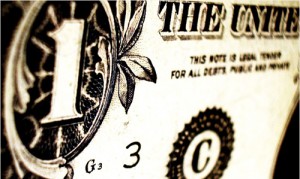Most of the recent “currency war” talk refers to countries trying to lower the value of their currencies to gain a trade advantage and/or make their debts more manageable. But this war has another theater, where a weaker currency is not the main goal.
Start with the premise that when a country conducts most of its trade in another currency, it cedes power to the “reserve currency” issuer. Right now that’s the US. Because oil and most other things are traded in dollars, the world’s central banks have to hold a lot of dollars as reserves. The resulting nearly-infinite global demand for dollars allows Washington to borrow as much as it wants, and to govern without having to make hard spending and tax choices that other countries have to live with. It also allows the US to fund a military that dwarfs everyone else’s and to throw its weight around in ways far out of proportion to its population or moral authority. If you’re a would-be superpower like China, Russia, India or Brazil, “dollar hegemony” is in your way.
So there’s an advantage to be gained by cutting the dollar out of bi-lateral trade in favor of one’s own currency. Here’s how China and Brazil are playing it:
China, Brazil sign trade, currency deal ahead of BRICS summit
BRICS members China and Brazil agreed on Tuesday to trade in their own currencies the equivalent of up to $30 billion per year, moving to take almost half of their trade exchanges out of the U.S. dollar zone.
The agreement, due to last three years and signed hours before the start of a BRICS summit in Durban, South Africa, marked a step by the two largest economies of the emerging powers group to make real changes to global trade flows long dominated by the United States and Europe.
“Our interest is not to establish new relations with China, but to expand relations to be used in the case of turbulence in financial markets,” Brazilian Central Bank Governor Alexandre Tombini told reporters after the signing.
Trade between the two countries totaled around $75 billion in 2012. Brazilian officials have said they hope to have the trade and currency deal operating in the second half of 2013.
At the summit in Durban, the fifth held by the group since 2009, Brazil, Russia, India, China and South Africa are widely expected to endorse plans to create a joint foreign exchange reserves pool and an infrastructure bank. They are also due to discuss trade and investment relations with Africa.
According to the IMF, dollars make up about 62% of allocated central bank currency reserves, with the other 38% in mostly euros and pound sterling. The yen accounts for 4%, and the Chinese yuan virtually zero. But China is now the world’s biggest trading power, with Brazil and India not that far behind. So why does the dollar still get to dominate world trade, with all the advantages that confers? Because it’s been that way since World War II, and old habits die hard. But as bi-lateral trade deals like the above become common, countries trading with China and Brazil in local currencies instead of dollars will need large yuan and real reserves and correspondingly fewer dollars.
If central banks start selling dollars to buy other currencies, this will, other things being equal, force down the dollar’s value. Which, ironically, helps the US in the other currency war theater, where victory is defined as a cheaper currency. An orderly transition to a multi-reserve-currency world would make US export industries more profitable and our debts less onerous (at least according to conventional wisdom).
The problem is that markets don’t normally do orderly transitions. They get going in one direction and then, when a critical mass of players decides the trend will continue, they go parabolic. The asset in question soars or falls off the table. So the combination of US policy designed to weaken the dollar and other countries actively trying to supplant the dollar as a reserve currency makes a gradual, smooth decline in the dollar’s value the least likely scenario.










